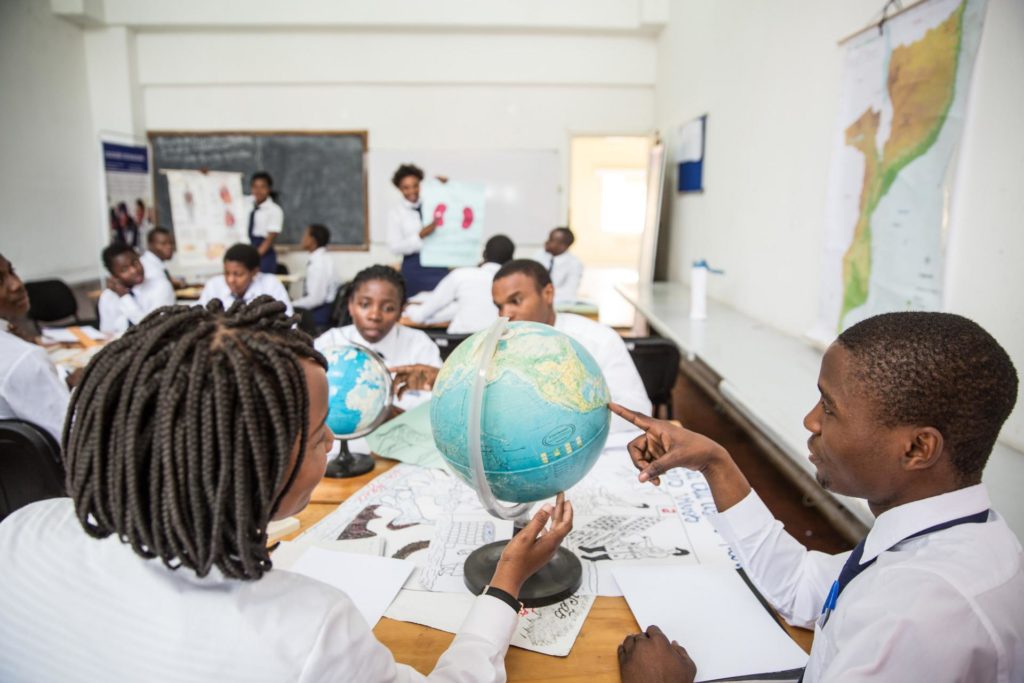
The objective of UFF’s work is to bring about sustainable development and to decrease extreme poverty globally at the same time. UFF is an independent non-profit foundation that works to achieve sustainable development through climate and development cooperation work. We promote lifelong learning and sustainable environmental and economic development.
We work for the achievement of United Nations’ Agenda 2030 goals and promote lifelong learning in sub-Saharan Africa and India amongst the most marginalized communities. The projects we support reach annually hundreds of thousand people in developing countries.
We have supported teacher training in for example Mozambique with the help of our clothes donors and shop customers for over 30 years. With our support, teacher training colleges have been established and supported in each of the 11 provinces of Mozambique.
Purpose
UFF’s work promotes sustainable development and supports the achievement of the Sustainable Development Goals of the 2030 Agenda. The Goal number 4 is to ensure inclusive and equitable quality education and promote lifelong learning opportunities for all.
Education is an effective way to reduce poverty and inequality in developing countries. Quality education is every child’s human right. Going to school is not in itself a guarantee of a better future for a child. The quality of the education has a major significance for children’s learning.
Global learning crisis means, for example, that even though most children can now attend school, they do not learn even basic skills there. The main reasons behind poor learning outcomes are lacking pedagogical skills of teachers and high teacher-student classroom ratio. In Mozambique, like in many other developing countries, there is a great shortage of qualified and competent teachers, particularly in the rural areas. There can be over a hundred students in a rural village classroom. Only about 40 % of children finish primary school and under 5 % of students can read age appropriately in the third grade.
Results
UFF’s work alleviates the learning crisis by improving teachers’ education. Knowledgeable teachers graduate from teacher training colleges and they are able to provide good quality education for children in developing countries.
Professional teachers graduate from the teacher training colleges for demanding teaching positions in rural village schools. Since the 1990s, over 23 000 teachers have graduated from these colleges constituting about 17 % of all Mozambican teachers. At the moment, over 2 500 students study at the supported colleges to learn a profession. Over a million children in Mozambique are receiving quality education from the teacher training college graduates.
Implementation
UFF and the Ministry for Foreign Affairs of Finland have enabled with their support the building and maintenance of the teacher training colleges since the 1990s. Civil war that ended in 1992 had destroyed school buildings and most teachers had left the country. The first teacher training college was established in 1993 in the capital of Maputo soon after the war had ended. The teacher training program is implemented with the cooperation of the Ministry of Education in Mozambique.
The colleges offer quality training to teacher students. The education is based on child-centered pedagogy instead of the traditional teacher-centered approach. Teacher trainees can first learn the benefits of student-centered learning in their own education and then can implement the same methods in their teaching. This way, teachers can better teach all learners.
Teacher trainees work together with local communities, for example with environmental and health education. After graduation, teachers continue similar activities for positive sustainable development in rural villages.
The graduated teachers continue with their professional development through local teacher networks. Through networking, they are able to share best practices and their own experiences with other teachers for the benefit of their students.
The impact of this approach of training the teachers can be extremely high on personal and local level. It is vital for the globe for these kinds of ground level actions to strive, even if on its own it has a minor effect on global scale. When the approach and the aims would be adopted by governments, and communities at large, the effects could be revolutionary.
As the local ministry in Mozambique is already involved in scaling up the impact, the approach is becoming more widely adopted. Though quality learning can be defined to mainly address SDG4, it touches all the SDG’s as information and the ability to process it as well as use it for good is key to all climate and environmental action as well as work conditions and innovation.
Good education is vital to better life and better globe.

Responses